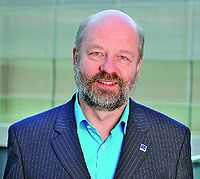Hans-Josef Fell
| Hans-Josef Fell | |
|---|---|
 | |
| Hans-Josef Fell | |
| Member of Parliament for member of the Green Party in the German Parliament | |
| Personal details | |
| Born | 7 January 1952 Hammelburg, Germany |
| Political party | Green Party (Germany) |
| Occupation | spokesman on energy for the Alliance 90/The Greens parliamentary group a member of the Environmental Protection Committee |
Hans-Josef Fell (born 7 January 1952 in Hammelburg) is a member of the Green Party in the German Parliament. Fell framed the German Renewable Energy legislation, together with Hermann Scheer. He currently serves as spokesman on energy for the Alliance 90/The Greens parliamentary group, a member of the Environmental Protection Committee, substitute member of the Committee on Economics and Technology and substitute member of the Defense Committee.[1]
Personal life
Hans-Josef Fell was born on January 7, 1952 in Hammelburg, Germany. He graduated from Gymnasium Hammelburg in 1971. He studied Physics and Sport Sciences at the University of Würzburg. Between 1977 and 1978 he did his civil service year in Würzburg with special education children. After passing the state teacher's exam in 1980, Fell began teaching physics and physical education at Alexander-von-Humboldt Gymnasium in Schweinfurt. Fell and his wife live in Hammelburg and have three children. The family house is built according to ecological criteria and runs completely on renewable energy. Fell has won awards for his home, including the international "Solar-Oskar", the Energy Globe Award 2000.
Political career
Hans-Josef Fell joined the Green Party in 1992 following years of interest in renewable energy and environmental protection. Fell worked on the city council in his hometown of Hammelburg from 1990 until 1998 and from 1996 until 2003 he worked in the county council in the Bad Kissingen district. He has been a member of the German Parliament since 1998. Hans-Josef Fell supported the shift in military training methods towards conflict deescalation, particularly at the Bundeswehr base in Hammelburg. From 1999 to 2005, as spokesman of the Alliance 90/The Greens parliamentary group on the German Bundestag’s research committee, Hans-Josef Fell helped to ensure an increase in funding for research into photovoltaics, concentrating solar power,geothermal energy, bioenergy, batteries for electric cars, bionics, nanotechnoloy and others. Hans-Josef Fell has initiated many technical assessment reports, which in some cases still offer important foundations for legislative developments today, for example: nanotechnology, geothermal energy, transport systems of the future, various medical issues such as research into the brain, nuclear fusion, and genetic engineering in agriculture and medicine.
Hans-Josef Fell wrote the draft of the Renewable Energy Sources Act (EEG), which was adopted in 2000 in the face of strong political opposition. The law, enacted 25 February 2000, guarantees cost-covering feed-in Tariffs for electricity from biomass, wind power, and solar power, and aimed to increase the percentage of renewable energy used in Germany to 12.5% by the year 2010 and 20% by 2020. In 2011, Germany was already generating 20% of its energy from renewable resources. He was also involved in drafting the law amending the EEG in 2004.
Hans-Josef Fell initiated legislation exempting biofuels from tax, and was also actively involved in establishing the legislative framework for renewables at the European level.
Hans-Josef Fell is the founder of the Energy Watch Group, an association of independent researchers and economics experts who are in the process of developing sustainable concepts to secure our global energy supply.[2] Additional key members are Werner Zittel, Jörg Schindler, Managing Director of Ludwig Bölkow Systemtechnik GmbH, Harry Lehmann, an expert from the World Council for Renewable Energy (WCRE) and Stefan Peter from the Institute for Sustainable Solutions and Innovations.
He currently serves as spokesman on energy for the Alliance 90/The Greens parliamentary group, a member of the Environmental Protection Committee, substitute member of the Committee on Economics and Technology and substitute member of the Defense Committee.
He is a signatory of the Prague Declaration on European Conscience and Communism.[3]
Awards
- 1994: Solar Prize of the European Solar Energy Association EUROSOLAR
- 2000: Energy Globe Award
- 2000: Solar prize of the German section of the International Solar Energy Society (DGS)
- 2001: Nuclear-Free Future Award – foremost prize of the international anti-nuclear movement
- 2002: German Solar Industry Prize
- 2002: First German Geothermal Award (the “Hard Rock Drill”)
- 2003: German Biogas Prize, Dr Heinz Schulz Memorial Medal
- 2006: Bonda Prize of the European Photovoltaic Industry Association (EPIA)
Publications
- Global Cooling – Strategies for climate protection, CRC Press/Balkema (Leiden, NL), 2012, 150 S. (Engl.), ISBN 9780415620772